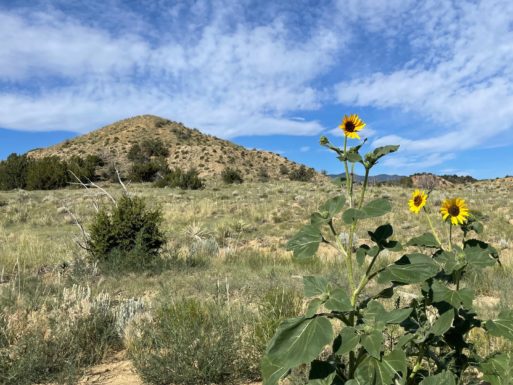
The Colorado Burial Preserve, a green cemetery where the state’s first composted human remains were laid to rest
Credit: Colorado Burial Preserve
The first person to undergo human composting in Colorado has been laid to rest. The individual, whose name has not been released, underwent a process known as “natural reduction” at The Natural Funeral in Lafayette soon after Gov. Jared Polis signed a bill making it legal in May of 2021. The body was placed in a filtered container with alfalfa and straw and a special blend of microbes that speed decomposition — turning the body into compost in about six months. The family donated the composted human remains to the Colorado Burial Preserve, the state’s first dedicated green cemetery, where a memorial ceremony honoring the deceased was held on Sunday, March 20, 2022. Not coincidentally, the date coincided with the vernal equinox, a day symbolic of renewal and rebirth.
Originally developed by a team of Seattle-based researchers known as the Urban Death Project, the idea of composting human remains was first brought to fruition in the winter of 2020 when Recompose Seattle,the world’s first legal human composting facility, opened its doors. Founded by designer and entrepreneur Katrina Spade, Recompose laid the groundwork for legalizing the process, which it dubbed “natural organic reduction,” in Washington State. After securing several rounds of funding, the public benefit corporation joined forces with soil scientist Dr. Lynne Carpenter-Boggs of Washington State University to complete a study on six donor bodies in 2018. Their research proved that natural organic reduction successfully eliminates pathogens (disease causing bacteria) and toxins from human bodies, leaving the remaining soil safe to use. Their research was enough to convince the Washington State legislature, which legalized the process (along with alkaline hydrolysis) in 2019.
Since that time, Oregon and Colorado have also legalized natural organic reduction, but The Natural Funeral is the first funeral home to offer the process in either state. (Recompose hopes to open a facility in Oregon soon.) As of this writing, The Natural Funeral has 15 bodies currently undergoing natural reduction (the name the company chose) and has invested in a total of 48 vessels. “We are anticipating a lot of growth,” said the company’s managing partner Seth Viddal in a statement to NBC News. The majority of interest has come from Denver and Boulder, Vidal explains, although several of its clients have come from out of state.
An Ecologically Sound Alternative
Natural reduction is an eco-friendly process compared to conventional burial or cremation, which may explain its growing popularity in areas like Boulder and Seattle, where the majority of the population is young, affluent and white. According to Recompose, the process uses about ⅛ the energy of conventional burial or cremation and nourishes the earth rather than taking up valuable space.
Unfortunately, eco-friendly doesn’t come cheap, at least not yet. According to Viddal, The Natural Funeral currently charges nearly $8,000 for natural reduction, while Recompose posts a cost of $7,000 on its website as of 2022. This is several thousand dollars more than the average cost of cremation, which, in the Denver area, is about $2,000 to $5,000. Nor is the price likely to decrease any time soon, says Viddal. “[Cremation] in its entirety is just a few hours, whereas with body composting we have a four-to six-month managed biological process,” he explains. The price may become more competitive in the future but will never equal the price of cremation, Viddal adds.

 First Composted Human Remains Laid to Rest in Colorado
First Composted Human Remains Laid to Rest in Colorado


 Our Annual Seven Holiday Gifts for Someone Who Is Grieving, 2024 Edition
Our Annual Seven Holiday Gifts for Someone Who Is Grieving, 2024 Edition
 “Making Mobiles” by Karolina Merska
“Making Mobiles” by Karolina Merska
 “Hands Up to the Sky” by Michael Franti & Spearhead
“Hands Up to the Sky” by Michael Franti & Spearhead














